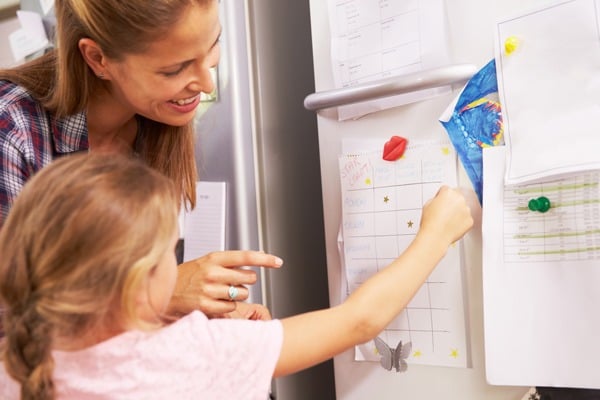How To Make A Chore Chart For Your Kids

Don't be the first to start picking up around the house. Create a children's chore chart and make tidying the home an activity for the whole family.


Don't be the first to start picking up around the house. Create a children's chore chart and make tidying the home an activity for the whole family.
How to get your kids to help out at home? Make a kid's chore chart.
As spring cleaning season approaches, you might be wondering how you can encourage your kids to help out around the house. A family chore chart is a great way to teach your children responsibility and encourage them to pitch in with the household chores. Here’s how to create an effective chore chart system for kids.
What household chores can my child do?
Children as young as two to three years old can start performing simple household chores, such as picking up their toys, with supervision. Beginning at age four or five, children can learn to use a family chore chart. Children’s maturity levels vary greatly, so you may need to adjust these chores to meet your child’s individual needs.
Here are some age-appropriate personal and family chores for kids. Keep in mind that children can complete all the chores for the earlier age ranges, plus the new chores in each age range.

4 to 5 years children's chores:
• Make their bed
• Help an adult carry in lighter groceries
• Clear the table
• Help an adult prepare food
• Match socks in the laundry
• Water flowers
6 and 7 children's chores:
• Set and clear the table
• Fold laundry with supervision
• Put away their clothes
• Put away dishes from the dishwasher
• Empty indoor trash cans
• Keep bedroom tidy
8–11 children's chores:
• Wash dishes
• Prepare a few simple meals and snacks
• Vacuum and mop rooms
• Clean the bathroom with supervision
• Learn to use the washer and dryer
• Put away their clean laundry
• Take garbage can to the curb for pickup
Ages 12 and 13 children's chores:
• Change the bed sheets
• Keep their room tidy and do a biannual deep clean
• Dust, vacuum, clean bathrooms and wash dishes
• Change light bulbs
Ages 14 and up children's chores:
• Do assigned housework without prompting
• Occasionally prepare meals as needed
• Do house work and yard work as needed
How to Make a Printable Chore Chart for Kids
First, make a list of the household chores that need to be done and have your kids choose the age-appropriate chores they want to do. Start with two or three chores per day so you don't overwhelm them.
Create a chart with these four columns:
• Household chore with specific instructions. Instead of just saying “clean your room” (which is too vague and open to interpretation), list the individual tasks involved, such as "put clothes in the dresser or closet, put books on shelves, take dishes to the kitchen and put toys in the toy box." Include pictures of the chores (or your child performing them) to make the chore chart more engaging, particularly for younger kids.
• The child responsible for completing the chore.
• Deadlines.
• Check when the chore is complete. For younger kids, stars or stickers are a fun way to indicate completed tasks.
Post the chart in plain sight. Chore chart software is available if you want to go high-tech.
Ease into chores for kids. Show them step-by-step how to do each chore, then have them help you complete each task. Next, have them do the chore while you supervise. Finally, when they’ve mastered the chore, your kids are ready to tackle their household jobs on their own.
Be consistent. Insist that your kids complete their chores regularly. If you don’t, they may skip it and wait for someone else to pick up the slack.
Don’t insist on perfection. No one is perfect, so it’s better to take a more relaxed approach to avoid a struggle. If you jump in and do the chores for your kids so they are “just so,” you’re defeating the purpose.
Go easy on deadlines and reminders. You want your kids to learn to do the chores without you nagging them every step of the way. Elizabeth Pantley, an author of several parenting books, recommends using the “when then” approach, like so: “When you put your toys away, then you can go outside.”
Praise your child. Children, like adults, want to feel needed and appreciated. Acknowledge their efforts by praising them while they’re working on the task, not just when they’re finished.
Learn how a home warranty helps cover unexpected system and appliance failures.

Should you reward your kids for doing household chores?
Some parenting experts believe that rewards prevent kids from developing their own sense of responsibility. Alfie Kohn, author of “Punished by Rewards,” asserts that even non-material rewards only control youngsters without achieving anything more than temporary obedience.
Many parenting experts agree that it’s usually a mistake to tie kids’ allowance to chores they are supposed to do anyway. Chores for kids are about responsibility and learning household tasks, not about money. Furthermore, younger kids may not appreciate money, so they may choose not to do the tasks. One exception is that older kids who already understand responsibility may be motivated by money to do extra chores above and beyond their usual assignments. In that case, consider having your kids bid for extra projects (such as washing the windows) and discuss what a fair value for the job is. This is another opportunity to teach your child the value of working hard and earning money, so be firm as you're coming to an agreement.
Other parenting experts believe that rewards can help parents teach their kids new habits. Dr. Virginia Shiller, a psychologist and instructor at the Yale Child Study Center and coauthor of the book “Rewards for Kids,” says the key to successfully using rewards is in how the incentives are given, in setting appropriate, realistic goals and in figuring out a strategy to achieve them.
Ultimately, choosing whether to reward your kids for doing household chores is a personal decision you will have to make for yourself.

How to use rewards effectively
If you choose to reward your kids for completing household chores:
Be very specific. Explain to your kids exactly what they need to do to earn a reward and when they will receive it. Will they earn a reward for every chore completed, or for completing a certain number of chores per week?
Make the rewards fairly immediate. Younger kids need to be rewarded shortly after performing the chore, while older kids understand working toward longer-term rewards. Rewards can be small, and they don’t need to be material items. Consider rewarding them with highly desired activities (such as computer or phone time) or a special outing with Mom or Dad. Ask your children what reward they would like to receive for completing their chores. Using food as a reward may not be a good idea, particularly for a child who struggles with maintaining a healthy weight. Children need to learn that food is primarily for nutrition and fuel, not a reward.
Place a sticker on your chore chart to remind younger kids of their achievements. Even older kids may appreciate a visual reminder that they’ve earned a reward.
By implementing a chore chart, you can engage your kids in daily household chores, teach them responsibility and lighten your load so you can spend more time together doing fun family activities.
AHS assumes no responsibility, and specifically disclaims all liability, for your use of any and all information contained herein.
Have a plan for your home when things don't go according to plan
Shop Home WarrantiesStaging